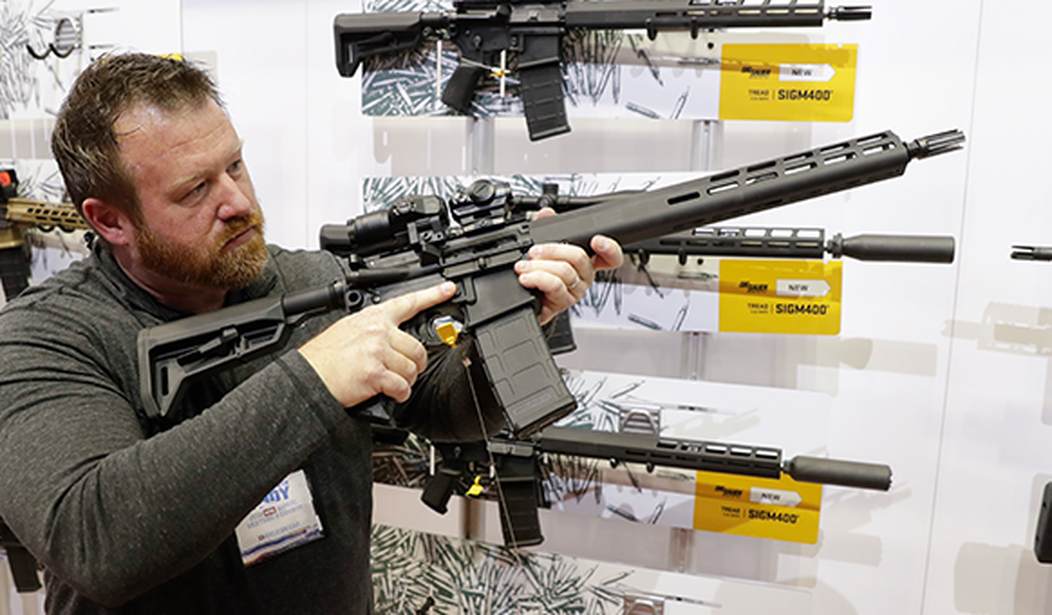U.S. District Judge Stephen McGlynn had tough questions for both sides during Wednesday’s hearing on a request to halt enforcement of Illinois’ ban on so-called assault weapons and large capacity magazines, but appeared to be skeptical of the state’s argument that the new law doesn’t infringe on the rights of state residents.
Plaintiffs’ attorney Erin Murphy was first up in challenging the ban imposed by lawmakers in early January, and handled McGlynn’s probing questions well; including this exchange over the limits of the legislature’s authority.
Murphy says the state has great leeway to punish misuse, many things they can do, but the Second Amendment tis there to arm against disarming law abiding citizens.
— Bishop On Air (@BishopOnAir) April 12, 2023
One of the most interesting moments of the hearing came when one of the defendants in the lawsuit ended up arguing in support of the defendants.
Owens argues there’s no doubt the text and history has the Second Amendment giving people the right to keep and bear arms. Says he believes Bruen changes the paradigm on how such laws can be enforced.
— Bishop On Air (@BishopOnAir) April 12, 2023
The state’s attorneys, on the other hand, claim that modern sporting rifles fall outside the scope of the Second Amendment’s protections, and can be banned outright without infringing on the rights of Illinois residents.
For the defense, Christopher Wells, chief of the public interest division in the Illinois attorney general’s office, argued that the case law cited by the plaintiffs did not meet the burden to strike down the weapons ban. He sought to compare military-use rifles, like M-16s, with AR-15s, which are subject to Illinois’ gun ban and have been blamed on many mass shootings in the U.S., and argued there isn’t much “functional difference” between the two weapons.
At one point, McGlynn went back and forth with Wells, questioning why guns with certain safety features, such as an arm brace, are subject to the ban.
“You’re making it illegal and you’re making it illegal for people” who can use those guns for self-defense, McGlynn said.
“Those features are associated with mass shootings and other criminal uses,” Wells told the judge.
“Think about how we regulate many dangerous things in society,” Wells told the judge at one point, pointing to laws against unsafe baby cribs.
“Baby cribs are not specifically protected by the Constitution,” McGlynn replied, while adding that he understood the analogy.
While the state argued that AR-15s and other modern sporting rifles are unsuitable for self-defense and therefore aren’t protected by the Second Amendment, McGlynn appeared to be unconvinced.
McGlynn gives scenario of wife home alone and four intruders. Wife has choice of shotgun with three rounds, handgun or AR15 with 5 or 30 round magazine. Suggests wife should take 30 round AR. "Who gets to decide?" McGlynn asks.
— Bishop On Air (@BishopOnAir) April 12, 2023
I think McGlynn’s closing comments were pretty telling as well.
McGlynn thanks attorneys and brief writers. Says "we see the victims and perpetrators and all want to see reduction of mass shooter crime, but from where I sit, I think we need to look at more than just the gun, but what are troubled teens doing, medicines taken, red flags. …
— Bishop On Air (@BishopOnAir) April 12, 2023
This doesn’t mean that McGlynn is a lock to grant the injunction, but it’s hard to see this exchange as a negative for gun owners and opponents of the ban.
There’s no word on when McGlynn will issue his decision, but I don’t think we’ll have to wait too long to learn what he has to say.
Of course, no matter how the judge decides, the losing side is likely to appeal to the Seventh Circuit (and ultimately the Supreme Court), and the state Supreme Court will get its own chance to weigh in next month when it takes up several county-level challenges to the ban that have resulted in TROs being issued by multiple circuit court judges.
For now, the ban remains in effect for most of the state (with the exception of those plaintiffs covered by the TROs), but the long term viability of law is very much in doubt. No matter how hard the state tries to argue that modern sporting rifles are not in common use, are not suitable for self-defense, or represent an “unprecedented societal change,” the fact remains that the state has criminalized the mere possession of some of the most popular arms in the country. That sounds like an infringement to me, and I suspect that McGlynn feels the same way.









Join the conversation as a VIP Member